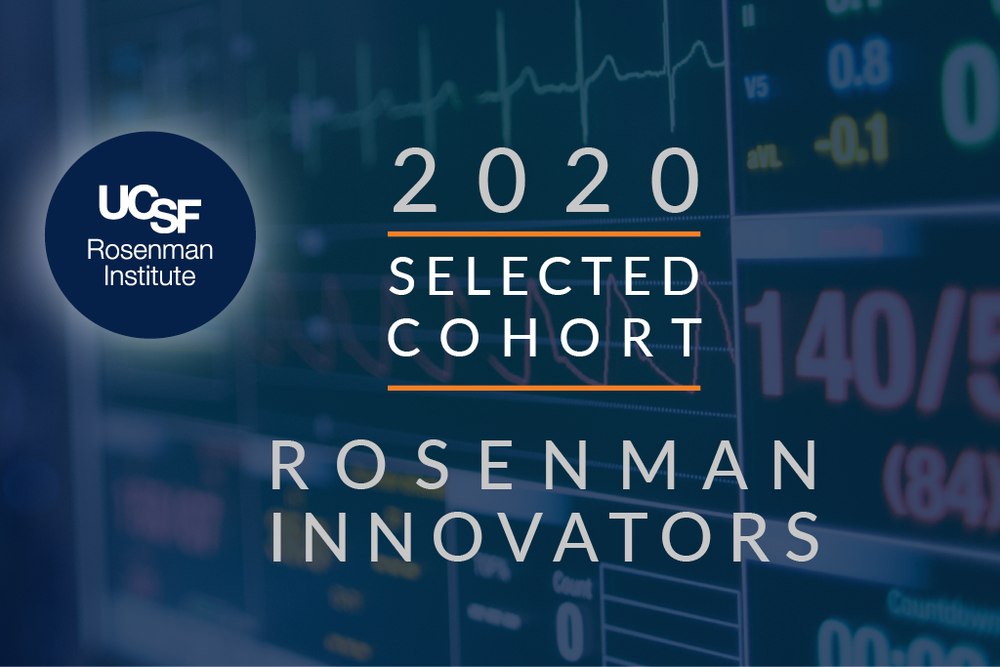The UCSF Rosenman Institute is proud to announce the 2020 cohort of the Rosenman Innovators, a group of early-stage companies chosen for their innovative technologies and patient impact.
2020 is the fifth year for the Rosenman Innovator selection cycle. To be eligible, companies must be developing technologies in the medical device, diagnostics, digital health, or health services spaces, and must be seeking funding from seed stage to Series A. More than 150 companies applied for this year’s selection, a record number.
“We are thrilled to be able to help such a dynamic group,” said Christine Winoto, founder and director of the UCSF Rosenman Institute. “We are excited to connect this year’s Rosenman Innovators with our network of investors, who often invest, and sometimes even lead the Series A rounds. We have seen many companies in our past cohorts make great progress and reach their milestones, such as obtaining FDA approval. Several have products and services currently in the market.”
Rosenman Innovators selected in previous years include Arterys, Graftworx, Innovein, GT Medical Technologies, and Zenflow. Deep Blue Medical Advances is the Rosenman Innovator most recently to have received FDA clearance, for its T-Line Mesh, approved for hernia repair on March 30, 2020.
The 2020 Rosenman Innovator cohort:
-
Aura Health is developing Aura, a mobile application that uses emotion data and audio content from the world’s best therapists to provide personalized, effective self-care and healing.
-
Avisi Technologies is developing VisiPlate to treat glaucoma, the world’s leading cause of irreversible blindness. VisiPlate is a nanotechnology-enabled ocular implant for treating glaucoma more safely and effectively.
-
InCaveo produces “intelligent” drug blister packaging coupled with a mobile app aimed at reducing addiction to opioids and other controlled medications.
-
Koya Medical has developed a next-generation connected wearable therapeutic platform to solve chronic lymphedema and chronic venous disease.
-
Liv Labs is developing a reusable vaginal pessary for comfortable, convenient self-treatment of female stress urinary incontinence.
-
mynurse.ai offers an AI-powered platform that surfaces the right information at the right time by analyzing the behaviors of the most effective nurses, paired with patient biometrics to evaluate the most effective interventions.
-
Nanochon is developing a 3D printed soft implant for treating surface cartilage damage in the knee. The device replaces the function of lost cartilage while growing new tissue.
-
Obsidio has developed a biomaterial platform technology for minimally-invasive occlusion of blood vessels. The technology can be used to control bleeding, cut off blood supply to tumor, and treat aneurysms.
-
Oncodisc is improving cancer care by building the world’s first connected implantable vascular access port, combining intravenous oncology drug delivery with reliable monitoring of patient physiology.
-
Renata Medical is developing a neonatal growth stent for congenital patients that eliminates the need for costly and painful open-heart surgeries.
-
SDIP Innovations develops bioresorbable scaffolds and implants for bone repair and replacement, JAZBI™. JAZBI™ provides a biologically natural and chemically neutral healing environment for bone renewal.
-
Sequel is a women health company led by Stanford University award-winning Design Engineering graduates. Their first product, a re-engineered tampon, prevents premature leakage to give women coverage when it matters.
-
Tiatros supports safe, effective, affordable, and highly scalable access to evidence-based mental wellbeing services; supportive participant peer communities; self-management skills training; and a unique database of structured/unstructured mental health data.
